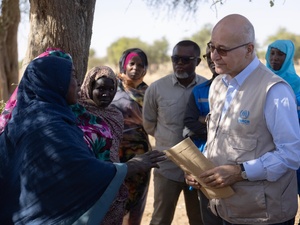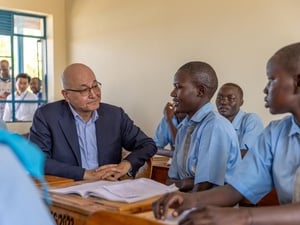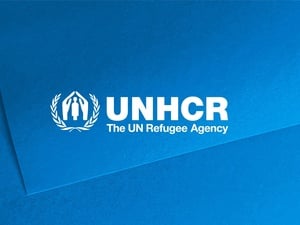New procedures set for Somali refugees to return home voluntarily from Kenya
New procedures set for Somali refugees to return home voluntarily from Kenya
Read the Tripartite Agreement [Zip file, 8.78Mb]
Nearly half a million registered Somali refugees in Kenya will get support when they return to their homeland in an orderly fashion -- if they choose to do so -- under an agreement signed Sunday by the UN refugee agency and the governments of Kenya and Somalia.
"It's very important to underline that no one is forcing Somalis to leave Kenya," said Raouf Mazou, UNHCR's representative in Kenya. "The government and people of Kenya have tirelessly provided protection and assistance to Somali refugees for two decades. The agreement we signed on Sunday does not mean Kenya is no longer willing to do so."
The agreement, known formally as a Tripartite Agreement, establishes a legal framework and other support for Somali refugees in Kenya who might eventually wish to return to their homeland. It defines the roles and responsibilities of the three parties in accordance with international standards.
"Among other things, this means any refugee has the right to choose whether to go home, after they have been given information about conditions on the ground in Somalia so they can make an informed decision," Mazou added. "It also means returns should be conducted in safety and dignity."
In the five camps that make up the Dadaab refugee camp complex in north-eastern Kenya, there are more than 388,000 Somali refugees. There are 54,000 Somali refugees in Kakuma camp in north-western Kenya and 32,500 living in the Kenyan capital, Nairobi, for a precise total of 474,483.
UN High Commissioner António Guterres, on a visit to Somalia earlier this year, acknowledged that Somali refugees are already voting with their feet and returning home by themselves to areas they deem safe. He said it would be inconceivable for refugees themselves to decide to go home and UNHCR not be there to assist them. For this reason, the Tripartite Agreement adopted an incremental approach to repatriation, starting with the provision of support to refugees who return on their own, leading to formal returns organized by UNHCR whenever conditions are right.
"This also means the agreement acknowledges the need for continued protection of Somali refugees in Kenya, and the need for other durable solutions to their plight," Mazou said.
Signing of this agreement became possible after formation of the Federal Government of the Republic of Somalia in August 2012 that allowed for open dialogue to gradually find solutions to Somali displacement. Consolidating peace in Somalia is challenging and the situation in parts of the country remains fragile. The process, however, is moving in the right direction and there are positive signs paving the way for solutions to displacement.
"We ask the international community to support efforts towards the creation of conditions conducive for safe and dignified voluntary return to Somalia," said Alessandra Morelli, UNHCR representative for Somalia based in Mogadishu. "No one wants to see refugees go home and have to flee again, or become displaced inside Somalia" She added that: "UNHCR will work closely with the donor community and development actors to ensure sustainable reintegration in areas of return."
For more information:
- Kitty McKinsey, Regional Spokesperson, UNHCR East, Central and Horn of Africa +254 735 337 608, on Twitter @KittyMcKinsey








